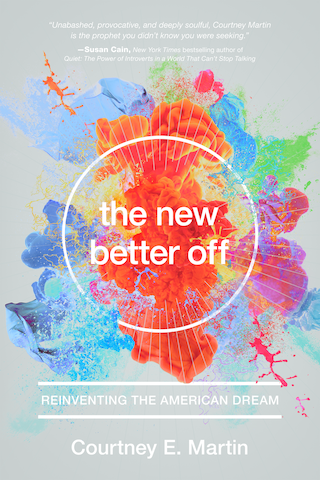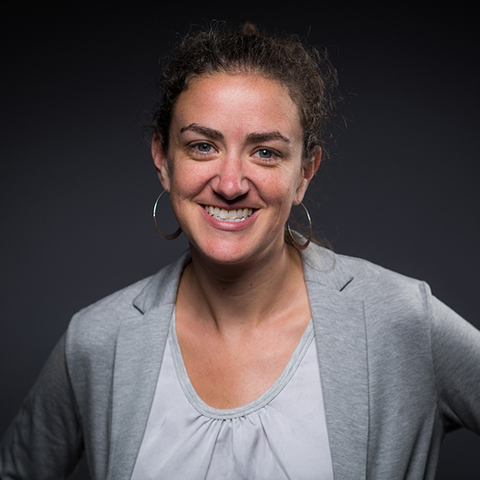|
|
|
See another section in Articles & Speeches |
|
|
Interview about The New Better Off
Reinventing the American Dream
by Courtney E. Martin

This is an interview about The New Better Off:
Reinventing the American Dream by Courtney E. Martin. Interview conducted by Marianne Schnall.
About The New Better Off: For the first time in history, the majority of American parents do not believe that their kids will be better off than they were. While some may see this as sad, Courtney reads it as a provocation: better off based on whose standards?
In this wide-ranging exploration of how the American Dream is being reinvented in the wake of the Great Recession, Courtney asks the biggest and most neglected of questions: how should we work? how should we live? how should we celebrate and mourn? Through profiles of everyone from home health care attendants to inventors to philosophers, and in-depth research and reporting, she paints a vivid picture of a new America, one where being better off is more about community and creativity than dollars and cents.
Marianne Schnall: What inspired you to write this book?
Courtney Martin: I was in my late 20s trying to figure out what kind of "adult" life I wanted right when the economy crashed. It really led me to do a lot of soul searching about what success and the "good life" really meant to me, and it turned out, a lot of people were asking some of the same questions I was.
The subtitle is "Reinventing the American Dream." How would you diagnose what was wrong with the old American dream?
The old American dream is about money, individual success, and the appearance of total independence. It turns out that there is ample sociological research that proves that none of this actually makes people happier or healthier, and in many cases, can even make people sick!
You are proposing a new definition of success and living the "good life" that has nothing to do with how much money or status one has. How would you describe this new paradigm of what makes for a "successful," happy, fulfilled life?
The new paradigm is about community, first and foremost, and joy and meaning. It's--in short--"I've got your back, you've got mine."
How did your own personal journey inform the insights shared in this book?
I have lived through this book in so many ways--as a new parent with an engaged husband, as someone wrestling with my own freelance career choices, as a member of a cohousing community. I always write the books I need to read. This one was no different.
Those of us who are drawn to or are living this new path, how can we collectively support the change that is needed to pave the way for the culture shifts that are described in this book - how can this become a movement?
I think there are actually a bunch of independent movements that possibly don't yet recognize one another as in cahoots. There is an amazing group of people, mostly women, unsurprisingly, reinventing the social safety net. There are also a bunch of people who are trying to make it easier for people to live local, interdependent lives--the folks at the Sustainable Economies Law Center and the Next System Project etc. One of the things I tried to do in this book is sort of connect the dots on a bunch of these collective efforts.
How are the themes you write, the ills of the old American Dream, related to the craziness we are seeing in the world today in the Age of Trump?
Trump, it seems to me, is a parrot for all the old ways of thinking about success--that it's an individual pursuit and solely about money and status.
Sometimes it can be challenging to go against the tide, take an alternative path, and not worry about what others will think or a road that is uncharted. Has that been an issue for you? What would you say to someone who is feeling drawn to this different way being and living but is feeling hesitant about taking that first step, or what others might say?
It's incredibly challenging to go against the status quo and honor your own knowing about what the good life really is, but the reward is so huge. It's nothing less than a meaningful, joyful life. What could be more motivating? Interestingly, I've heard a lot of kids say they're buying this book for their parents because they feel like it finally gives language to choices they've made that have seemed odd to their family members. I love that.
Right now many people are feeling disconnected from each other, even from our families, and the interactions we have these days are often through our cell phones and the Internet. You write about how we have also "lost the art of neighborliness." How can we bring back that sense of community and connection and why is it important?
Knowing your neighbors not only makes you healthier and happier, but safer in times of natural disaster or in terms of crime. And yet so many of us still live largely privatized, overly online lives. In some ways, the first step is the hardest. Throw that phone in a drawer for 24 hours on the weekend. Knock on your neighbors' door. I also really recommend creating rituals around community, because it's just easier that way. Create a co-op dinner group and throw it on the Google Calendar.
You write about how one of the trends that is part of this shift is around men wanting different things too - wanting to be more active, involved parents, and not have a man's whole life be centered around work and career. Can you talk about that? How can we help men redefine their sense of identity and also work against those types of cultural stereotypes?
There's no question that men are becoming increasingly interested in and invested in caretaking. They're also "coming out" about it publicly, which I think is a huge step. The more that we hear men struggling with work/life balance out loud, the more that these issues will no longer get pigeonholed as women's issues and we might even see real federal policy for the first time protecting family leave and increasing people's access to affordable childcare and preschool.
Anything else you would want to say or get out there? And what do you hope readers take away with from reading this book?
My biggest hope is that the book helps readers look at their own lives both critically and compassionately, and take action to create community that nourishes and delights them.
For more information: THE NEW BETTER OFF: REINVENTING THE AMERICAN DREAM by Courtney E. Martin. Published by Seal Press.
 Courtney E. Martin is an author, entrepreneur, and weekly columnist for On Being. She has authored five books, including Do It Anyway: The New Generation of Activists, and Perfect Girls, Starving Daughters: How the Quest for Perfection is Harming Young Women, and her work appears frequently in national publications such as The New York Times and the Washington Post. Martin speaks widely at colleges and conferences, including TED, and has appeared on TODAY, Good Morning America, MSNBC, and The O'Reilly Factor. She is the co-founder of the Solutions Journalism Network and The Secret Society for Creative Philanthropy and a recipient of the Elie Wiesel Prize in Ethics. She lives with her family in Temescal Commons, a co-housing community in Oakland. Read more about her work at www.courtneyemartin.com Courtney E. Martin is an author, entrepreneur, and weekly columnist for On Being. She has authored five books, including Do It Anyway: The New Generation of Activists, and Perfect Girls, Starving Daughters: How the Quest for Perfection is Harming Young Women, and her work appears frequently in national publications such as The New York Times and the Washington Post. Martin speaks widely at colleges and conferences, including TED, and has appeared on TODAY, Good Morning America, MSNBC, and The O'Reilly Factor. She is the co-founder of the Solutions Journalism Network and The Secret Society for Creative Philanthropy and a recipient of the Elie Wiesel Prize in Ethics. She lives with her family in Temescal Commons, a co-housing community in Oakland. Read more about her work at www.courtneyemartin.com
***
Marianne Schnall is the founder and executive director of Feminist.com. Her writings and interviews have been published widely in print and online. Schnall is the author of Daring to Be Ourselves: Influential Women Share Insights on Courage, Happiness and Finding Your Own Voice and What Will It Take to Make a Woman President? Conversations About Women, Leadership & Power. For more information visit her web site at marianneschnall.com
|